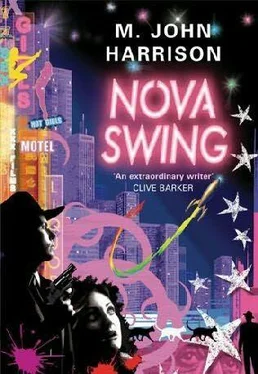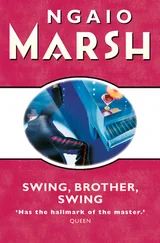"I can't believe it works," Liv Hula said.
After that, they lived in the ship, all three of them, and made frequent baby steps like this, little journeys into space. Though they had their differences of viewpoint, Liv and Irene got on well together, as long as they could manage Antoyne in their different styles. Antoyne was content to be managed. In the end, it was what he was used to, although he wouldn't admit that to the Mona. There was always something to talk about. Antoyne and Irene talked about their personal development and aspirational goals. Irene and Liv talked about the importance of self-presentation. Liv and Antoyne talked about Vic Serotonin, who had in so many senses brought about their present business venture.
"I always got involved with people stronger than me," Antoyne told Liv. "In the end you would have to say it was a pattern. But it can work out well."
Liv shuddered.
"People like Vic are too strong for everyone around them."
But when she repeated this opinion to Irene, it received only a sniff. "Vic Serotonin was as weak a man as I ever saw," the Mona stated firmly. "Trust me, I seen a few of them." She laughed. "And fucked them all," she added, "disincluding Vic himself."
This conversation occurred about thirty thousand miles off-planet. Without they took her off the beach, Antoyne said, and into the surf, everything was known about the Nova Swing that could be known. So now they were going to switch on the Dynaflow drivers for a nanosecond or two and see if she survived that blatant challenge to physics. But before they could do that, they had to fly through this huge secret-looking region of derelict ships they found themselves in. Cutting arcs flared as bright as pSi engines, through a smart fog of nanotech like ionised gas. Tugs were pushing and pulling the enormous rusty hulks about. It was a region of activity stretching away like a shell round the whole planet, an expanding wavefront a thousand, two thousand miles deep. Irene stared out the porthole. She knew human beings a little, she said, and that was hard enough because there were so many of them to know; but she would never cease to be surprised about the endless wonders you saw up here in space.
"What are those things?" she whispered to herself.
"The quarantine orbit," Liv Hula told her, "gets bigger every day."
***
Straint Street: Edith Bonaventure knocked out Liv Hula's old zinc bar and had a small stage built where it used to be. The floor was ripped up and replaced with black and white tiles. A contractor fixed her some wall panels of faux mahogany in a warm burnt-orange shade. Edith dispensed with the ceiling fans and fitted chandeliers in their place. She had a new bar manufactured from one long block of artfully melted glass, backlit glass shelves behind.
With the change of theme she wanted light. The theme was Edith. It was all of Edith's memorabilia, with which she could now experience a different, much more certain, much more creative relationship. Light was everywhere, gilding the keyboard ivory of fifty or sixty accordions in their deluxe presentation cases lined with every shade of pink from salmon to neotony; glittering as off shallow water from clear resins over maroon and ginger met-alflake finishes; spiking the corner of your eye with reflections and interference patterns of otherworldly weirdness. There were silver buckles on every strap to catch it, and brass-plate rocket ships craftsman-tacked to silky alien wood finishes: but chrome shooting star emblems predominated.
"Because," Edith would explain, "that's what I was, in my day."
Twice a week she got up on stage and played tango standards to a packed house, adding curios and marginal items for variety and to demonstrate the strength in depth of her technique. Some of these-Lindie's Alcine Rein, for instance, which was really a polka written for a five-million-year-old instrument no one was sure how to play-grew popular in their own right. Despite the fading ads recovered from venues all over the Halo, which she set to fluttering round the room with news of gigs she had played twenty years before, no one remembered her. Instead, they received her act as something novel and surprising. This hardly mattered to Edith, to whom it seemed enough that she should rediscover herself. She stood dazzled in the spotlight in her straps and taps, her pipeclayed face, her too-tight little costume, perhaps with a cowboy theme that night, and she could hardly tell herself from the thirteen-year-old Accordion Kid in the hologram. She had begun to feel awkward again without the burden of the instrument, as if perpetually released to lean backwards from the waist. She practised new tunes in the afternoon.
Edith was always on the premises, but she didn't keep bar. For that, she had hired Liv's ex-beach bunny, who, it turned out, called himself Nicky Rivera because he liked that upscale brand of luggage. Nicky was a successful choice. He lived quietly above the business. He fixed the sink. His people skills proved pivotal in attracting trade. He helped out with new acts too: Edith was picking up musicians from all over the city. Within months they were crammed every night.
The crowd was new to the tango, pleased with itself because it learned so quickly when to cheer and when to be rapt. Its signature was high-end cocktails, honey-coloured fur; its underwear, Nicky could confirm, was from Uoest. It was a slumming crowd, and if she hoped to gentrify the street by her efforts, Edith could only be disappointed. But as a result of her investment in herself, the reputation of her venture grew out beyond Straint, and even Saudade itself, out into the Beach stars and across the Halo, and she had to be content with that. Not many people get two chances to be new. She stopped playing the gates of the corporate port. Instead, she placed her own ads with the rickshaw companies, and later with the tourist lines themselves.
Sometimes the applause at the end of the evening caused her some tears. Then she would whisper, "This encore I would like to dedicate to the one who meant most to me in this life, Emil, my father: Le Tango du Chat, which he particularly enjoyed," which was how Liv Hula's bar came by its new name.
One afternoon near Christmas, Liv herself could be found sitting at a table with the Accordion Kid, drinking vodka and Brilliantine, no ice. Out on Straint the chopshops were closed early. Little hard gusts of wind ran up and down the street, driving the flurries of snow before them; while inside, on the dusty unlit stage, three teen sisters in sequinned one-pieces cast sidelong glances at Nicky the barkeep, who sat on the edge of the stage in conversation with their manager. "Sun and shade sometimes seem like equal things," Liv heard him say. "Both, in a way, kind of illuminating?"
At this the Accordion Kid, her sensibilities honed by thirty years in bars, smiled and closely watched Liv Hula's face.
"So now how do you like what I did?" she said.
Liv wasn't sure. It was Christmas. It was coming dark. Next day she would be out on the cusp of a new life, a rocket jockey delivering unwaybilled cargoes to ports she didn't know on planets she was the last to hear of; some of those cargoes would be more clandestine than others. The first time Liv came back to the Tango of the Cat, some weeks before, she had been ready for change, but also nervous what she would find. When she went inside, ten years of her life tucked themselves away in an instant, like the theoretical dimensions of long-ago cosmology. This was how life went. A single moment seemed to extend forever, then suddenly you were snapped out of it. The forward motion of time stretched whatever rubbery glue-like substance had fixed you there until it failed cata-strophically. You weren't the person you were before you got trapped; you weren't the person you were while you were trapped: the merciless thing about it, Liv discovered, was that you weren't someone entirely different either. Pondering these notions, she heard herself say:
Читать дальше












